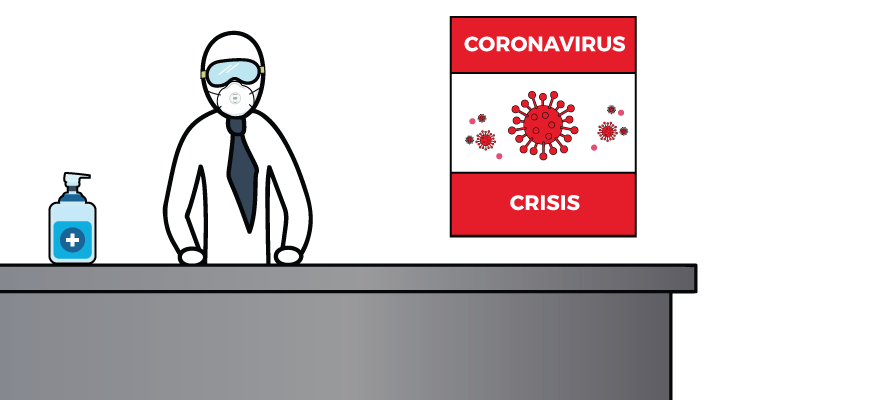Crisis Management: The Overlooked Leadership Skill

Crisis Management: The Overlooked Leadership Skill
Here are five ways to rise up to the challenge of leading the troops while things are falling apart.
By Gary Burnison, CEO, Korn Ferry
No one thinks much about a certain leadership quality — until the you-know-what hits the fan. The quality I’m referring to is crisis management.
Thankfully, true crises are relatively rare occurrences. They are the black swans of leadership.
We’ve done nearly 70 million assessments of executives, so we know what makes a great leader — the best-in-class who are among the top 20%. Our research shows that three of the four qualities of a great business leader are largely intuitive: (1) sets vision and strategy; (2) drives growth; and (3) displays financial acumen.
The fourth is managing crises. It’s underappreciated, overlooked, and often not even one of the top requirements — until a crisis hits.
This is one of those times. A month ago, when the stock market was making all-time highs, only the rare few could have predicted universities would close, companies would tell employees to work from home en masse, and the NBA season would abruptly be suspended, followed by museums, cathedrals, and Broadway.
While it’s natural in uncertain times for people to turn to the leader for definitive answers, sometimes the authentic answer is “I don’t know right now” — quickly followed by, “And here’s what we are going to do.” In a crisis such as today, leaders need a Plan B — and a Plan C and Plan D as well.
Leaders always deal with ambiguity. It’s timeless and comes with the job. During crises, ambiguity becomes exponential. As fear becomes contagious across organisations, leaders must manage their own responses to ambiguity.
How do they do that? By following our six steps of leadership:
Anticipate– predicting what lies ahead
Navigate– course correcting in real time
Communicate– continually
Listen– to what you don’t want to hear
Learn– learning from experience to apply in the future
Lead– improve yourself to elevate others
Let me provide some colour commentary on what leaders can do to put crisis management in action.
Start at the Bottom of Maslow’s Hierarchy: In a crisis, you first need to meet people where they are. Their most basic needs must be met and they need to feel safe. Naturally, no one is interested in talking about the company’s strategic plan when they’re out buying hand sanitiser and toilet paper. Once their essential needs are addressed, then the focus can shift to alignment, common purpose, elevating others, and even opportunities for growth.
By running the “unknown” of the current crisis against the “known” of previous ones, leaders gain perspective, identify patterns, connect the dots, and determine appropriate and timely responses.
Earthquakes and Aftershocks: In Los Angeles, where our firm is based, we’re accustomed to earthquakes and know that when one occurs, aftershocks are coming. Other crises also demand that you have to anticipate the consequences of the initial shock. Too often, people don’t consider all the possibilities. Anticipation becomes a Monte Carlo simulation in action.
For example: what if travel bans expand, commerce slows, or a liquidity crisis develops, etc.? What is the impact on all aspects of my business? What are the implications for employees, customers, and investors? Strategy is making a bet, and the skill of anticipating improves one’s odds.
Urgent vs. Important: Day to day, leaders face a multitude of issues, both urgent and important. I’ve found that many leaders have difficulty distinguishing between the two. When a crisis hits, though, everything blurs as events and their implications constantly change. What’s important often becomes urgent, and what’s urgent becomes critical. Leaders must delegate the urgent by empowering others to lead around a common purpose.
Leave No One Behind: In a crisis, leaders must connect with, motivate, and inspire others, and show genuine compassion. In the military, for example, leaders put the safety and well-being of others before themselves. I’ve met a number of military leaders who led during periods of conflict and voluntarily told me, “I’ve never lost a soldier.” This reveals a deep mindset of humility and accountability, rather than hubris and bravado.
Know What to Do When You Don’t Know What to Do: There’s nothing like a crisis or a complex problem to accelerate learning. This is learning agility to the “Nth” degree — applying past lessons to new and unfamiliar situations. It really is knowing what to do when you don’t know what to do.
Amid uncertainty, leaders need to be hyper-focused on past experiences and synthesise and apply them to real-time, fluid conditions. Clarity comes from finding a close comparison. Is it like the Great Recession? The 1987 stock market crash? The outbreaks of SARS or MERS?
By running the “unknown” of the current crisis against the “known” of previous ones, leaders gain perspective, identify patterns, connect the dots, and determine appropriate and timely responses. The eventual recovery may be a V or a U or some other alphabet letter, but there will be a new normal — thanks, ultimately, to the scientists, innovators, and dreamers.
The natural inclination in a crisis may be to go into command-and-control mode. That’s not leadership. Leadership is creating a “bottom-up” culture of world-class observers to accurately perceive today in order to predict tomorrow.
Gary Burnison is the CEO of management consulting and recruiting firm Korn Ferry.
Source: https://www.cfo.com/leadership/2020/03/crisis-management-the-overlooked-leadership-skill/




